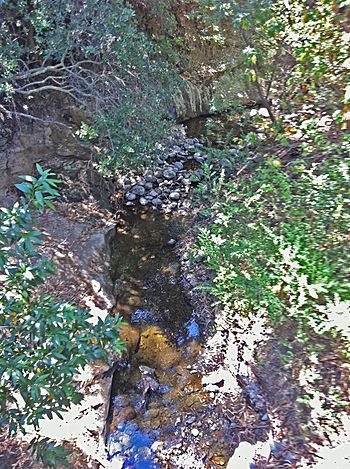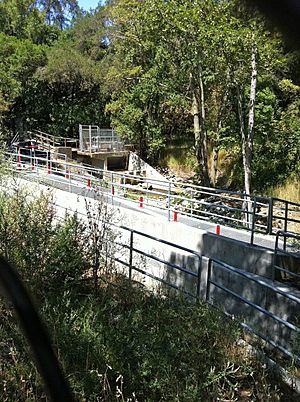Los Trancos Creek facts for kids
Quick facts for kids Los Trancos Creek |
|
|---|---|

Los Trancos Creek just upstream from Piers Lane Bridge with perennial pools at end July 2011.
|
|
| Other name(s) | Los Stancos Creek, Los Staneos Creek, Stancos Creek, Strancos Creek |
| Country | United States |
| State | California |
| Region | Northwestern Santa Clara County and southeastern San Mateo County |
| City | Portola Valley, Menlo Park, Stanford University |
| Physical characteristics | |
| Main source | Los Trancos Open Space Preserve on the northwest slope of Monte Bello Ridge 2,080 ft (630 m) 37°24′26″N 122°14′15″W / 37.40722°N 122.23750°W |
| River mouth | San Francisquito Creek West edge of Stanford University below Interstate 280 164 ft (50 m) 37°24′50″N 122°11′30″W / 37.41389°N 122.19167°W |
| Basin features | |
| Tributaries |
|
Los Trancos Creek is a stream in California, United States. Its name comes from the Spanish language words "Las Trancas," meaning "barriers" or "cattle guards." This creek flows north from the Santa Cruz Mountains. It eventually joins San Francisquito Creek near Stanford University. Los Trancos Creek also forms a natural border between parts of Santa Clara County and San Mateo County.
Contents
History of Los Trancos Creek
Los Trancos Creek plays a role in supplying water to Felt Lake. Felt Lake is a reservoir located west of Interstate 280. It was built in 1876 by a man named Job Johnston Felt. He was a gold miner and lumber dealer. Felt bought 700 acres of land and dreamed of creating water companies. He built the first system to move water from Los Trancos Creek to Felt Lake.
However, Job Felt faced challenges with his plans. By the mid-1880s, he decided to give up on the water company idea. He sold his farm to Timothy Paige. Soon after, in 1887, Leland Stanford Sr. bought the land. Stanford University later made the dam bigger. This helped store more water for the growing university campus.
What is a Watershed?
A watershed is an area of land where all the water drains into a single stream, river, or lake. The Los Trancos Creek watershed covers about 7 square miles (18 square kilometers). The creek itself has about 6.6 miles (10.6 kilometers) of channel.
Where Los Trancos Creek Starts
The creek's starting point, called its headwaters, is in the Los Trancos Open Space Preserve. This area is protected and is located northwest of Page Mill Road.
Tributaries of Los Trancos Creek
Several smaller streams, called tributaries, flow into Los Trancos Creek.
- Buckeye Creek is a small tributary joining from the east. It starts in Palo Alto Foothills Park.
- Felt Creek is another small stream. It begins in the Pearson-Arastradero Preserve. This creek was dammed to create Felt Lake. During winter, a special ditch moves water from Los Trancos Creek to Felt Creek, which then flows into Felt Lake. After the lake, Felt Creek rejoins Los Trancos Creek.
Los Trancos Creek eventually meets San Francisquito Creek. This meeting point is near Piers Lane Road, between Interstate 280 and the Stanford Golf Course.
Animals and Plants (Ecology)
Los Trancos Creek is home to important wildlife.
Steelhead Trout
In 1929, Stanford University built a dam on Los Trancos Creek. This dam helped move water to Felt Lake. However, it blocked steelhead trout (Oncorhynchus mykiss) from swimming upstream. Steelhead trout are a type of fish that live in both fresh and saltwater. They need to swim upstream to lay their eggs.
To help the fish, Stanford University built a new fish screen and ladder in 2009. This ladder allows the steelhead trout to pass the dam and reach over 3 miles (4.8 kilometers) of clean spawning grounds upstream. The upper part of the creek is protected in the Los Trancos Open Space Preserve.
Steelhead trout lay their eggs from February to April. The number of trout can change a lot, from none in dry years to hundreds in wet years. Young trout spend about two years in the creek before heading to the ocean. Studies have found many young trout living in the Stanford part of Los Trancos Creek.
Bald Eagles
From 2016 to 2020, a pair of bald eagles (Haliaeetus leucocephalus) made their nest near Felt Lake. They chose a large eucalyptus tree close to the Pearson-Arastradero Preserve.
Hiking Along the Creek
Los Trancos Creek offers great places for hiking.
Piers Lane Area
You can start a hike from the Piers Lane parking area on Alpine Road. This trail crosses both San Francisquito Creek and Los Trancos Creek. It then leads to the Stanford Dish. This area is open from sunrise to sunset. Remember, bicycles and dogs are not allowed on this trail.
Los Trancos Open Space Preserve
The upper parts of Los Trancos Creek are easy to reach from Page Mill Road. This area is part of the Midpeninsula Regional Open Space District. It has several trails, including:
- Lost Creek Trail
- San Andreas Fault Trail
- Page Mill Trail
- Los Trancos Trail
 | Jackie Robinson |
 | Jack Johnson |
 | Althea Gibson |
 | Arthur Ashe |
 | Muhammad Ali |


